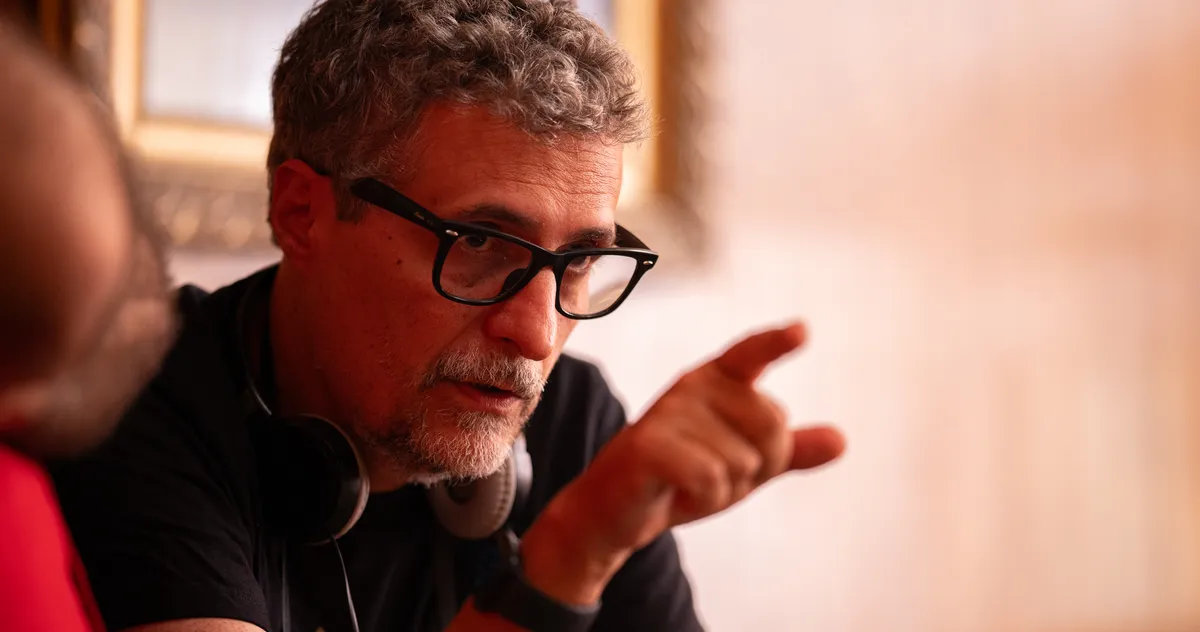
Brazil is in turmoil in Kleber Mendonça Filho’s latest film, the political thriller The Secret Agent. It’s 1977, a military dictatorship is in place, and countless people in the country are affected by the cadre’s brutality, fake news, and corruption. University professor turned political refugee Marcelo (Wagner Moura) is the film’s entry point, and around him, Mendonça Filho weaves a complex web of relatives, fellow dissidents, like the elderly Dona Sebastiana (Tânia Maria), and enemies, including young assassin Bobbi (Gabriel Leone), all of whom have their own often-conflicting agendas. The result is an immersive, urgent, playful, and devastating film that, while experimenting with genre and time, finds surprising commonalities between Brazil 50 years ago and the world today.
Using a backward gaze to find relevance in the present is not new for Mendonça Filho, who began his career as a film critic, started directing short films, and then delivered a series of critically acclaimed films about life in Brazil, including the documentary Pictures of Ghosts and the features Neighbouring Sounds and Aquarius. His films tend to have a David-versus-Goliath quality in their characters and their narratives, particularly his 2019 breakout Bacurau, a genre experiment that imagined what would happen if bloodthirsty outsiders attacked a small rural village. The result was a gonzo spaghetti Western that seethed with anti-colonialist sentiment and won the Jury Prize at the Cannes Film Festival. As a follow-up to that film, The Secret Agent (which was also awarded at Cannes, with Mendonça Filho and Moura winning Best Director and Best Actor, respectively) is totally different. The Oscar-buzz-y film, which will play at the New York Film Festival and open in theaters November 26, moves slower than Bacurau. Its story sprawls more, and its villains are exclusively Brazilians acting against their fellow Brazilians. There’s a frustration with the status quo, and a concern about how the future will view us, that drives both films, and that Mendonça Filho maneuvers to visceral, poignant conclusions.
You worked on this script for three years. You dug into your personal archives. How did the idea begin, and then how did you develop it?
The idea actually began with another film with the same title, The Secret Agent. It was the first time that I tried to write a script and it didn’t pan out. I had been working in parallel with Pictures of Ghosts, which took seven very easygoing years. I went through my own little archive, my videotapes and audio tapes, a lot of photographs and newspapers. And slowly I reconnected with many personal memories, particularly from childhood, because I was a little kid in the ’70s. They came very strong as I connected the dots with the city and with my early experiences with filmgoing. And of course, when you do that, you bring all the other stuff: my parents and people from the past and stories that I remember and stories that I discovered in newspapers, and the whole logic of Brazil in the 1970s, which was under a military dictatorship. All of that gave me the strength to actually go into a new script, and I thought the same title would be great.
Brazil was going very much to the right politically, after many good years being in the hands of the left, or a possible version of the left in the early 21st century, with Luiz Inácio Lula da Silva and the Workers’ Party. The move to the right was not really democratic; it was quite cynical, in my opinion. And for all these people it brought back a sense of nostalgia about the military dictatorship. But I’m telling you this in hindsight, because as I began to write, I don’t think I was really aware of this. I think all the emotional stuff from Pictures of Ghosts was the entry point into writing the script. But I slowly realized that the logic of Brazil and its society, particularly under Bolsonaro, was very much the logic of 50 years ago. They were bringing back dreams of the military running the country, which is really, really absurd. Homophobia was officialized, and misogyny and internal racism were supported by the administration. I come from the Northeast, and there is a kind of a fascinating and very painful division between the Southeast and the Northeast. The Northeast has always been very strong in culture and in its own ways of doing things, its own way of speaking, with our own accents, and the money was always historically concentrated in the Southeast. That really came back under Bolsonaro, in things he and his government said about the Northeast. He lost in every state in the Northeast, so he had a big chip on his shoulder about the Northeast. All of that, to make a very long and complex process understandable in our conversation now, is how the script came together.
What do you think that The Secret Agent represents in terms of your worldview as a filmmaker and as a Brazilian?
It’s a very hard question to answer, because you’re asking me to look at my own film. I can only tell you how good I felt about writing a number of characters whom I really like. I even like the incredibly problematic characters, because I think they are the byproduct of a society which is problematic. I understand that some people call some characters villains, and they probably are villains, but I think they are quite authentic. Of course, it’s fiction, but there’s a lot of emotional truth in many of these characters.
Was there one problematic character you enjoyed writing the most?
The thing with writing — and this is something that I have said a number of times, and it goes for characters and it goes for scenes and sequences — there can never be a scene or a character I don’t want to go back to. There can never be a scene where I say, “Oh, boring. I don’t want to do that.” Everything has to be interesting. And I like Bobbi the same way I like Sebastiana, because I think Bobbi is a really interesting character as a byproduct of violence — a male model which is quite hateful, but it exists. I might have met some of these guys at some point, maybe in school, maybe on the street, maybe at somebody’s house. I’m interested in all of them. Euclides is the police commissioner. I think he’s completely fascinating. He’s also a classic case of somebody from the right who has some difficulty in understanding and reading the world. He’s obviously fascinated with the German army in the Second World War. I was introduced to people like that when I was a kid, and I noticed that they came back in the last ten years in my country. They manage to turn things upside down and to their own specifications, and that’s how they want to see the world.
Euclides and his fellow cops are convinced that the German tailor Hans, played by Udo Kier, was a Nazi and fought in World War II. The audience learns he’s actually Jewish, but the cops can’t even fathom that, right? That’s such a glimpse into the way people can force our assumptions on a situation, even if they don’t align with the truth.
Recife is a city that has a very well-known, strong Jewish community. I grew up with friends from the Jewish community. Jews came from Europe in the early 20th century, before the Second World War, during and after the war. Clarice Lispector, she’s from Recife — a wonderful, amazing writer. She came from Ukraine in the early ’20s as a child. I live about a mile from her family house. So even with the Jewish community, he couldn’t understand that a German can be a Jew. You’ve got to know a little bit more about history to understand that, but it’s possible.
I read an interview where you said you don’t think of your films as “classically” political. I think of your films as very political. They tackle racism, overdevelopment, the gap between the rich and the poor and the problems facing rural communities, and of course The Secret Agent is about the effects of the military dictatorship and the emboldened police force. Can you tell me what you meant by “classically,” and how you think your films do or don’t align with that definition?
When I say that, I go back to my early years as a cinephile. I remember seeing Salvador by Oliver Stone. Under Fire, a really beautiful film by Roger Spottiswoode, with Nick Nolte, Gene Hackman, an amazing score by Jerry Goldsmith. It’s set in Nicaragua, with all the turmoil in 1979. The Costa-Gavras films: Z, Special Section, Missing, which got the Palme d’Or in 1982. Nixon by Oliver Stone, Talk Radio — that’s probably close to my films because it’s about freedom of speech. The Battle of Algiers. Films that take place in a government building, like The Candidate with Robert Redford. Those are classically political films. But I don’t think Aquarius would qualify as a classically political film. It is political because it’s about a woman who says, “No, get the fuck out of here,” and then men are very angry at her. But I don’t think it’s a classically political film like Salvador. Bacurau is a political film, but it’s a western and it’s a classic story of a community under siege. Isn’t that political? Of course it is. Look at what’s happening in the world right now. But I never sat down and said, “Another political film, yes!” I accept the interpretation that my films are political, but not in the way I see them as “classically” political.
I love how The Secret Agent plays with time: We’re following the main storyline in the 1970s, and then we jump forward into the future, with two women discovering Marcelo’s story as they listen to archival tapes that recount what he was going through in this time as a political refugee. How did you think of time in relation to the film, as a tool or as a theme?
This was no different from my other films and the way I look at books, pieces of paper, letters, and cinema, because every film is a document to the time that it was made, even the lightest romantic comedy. This morning in Madrid I visited the archives of the Spanish cinematheque. It was a wonderful, wonderful moment. The truth is, we’re all getting older. I’m 56 now, and I suppose I’m quite sensitive to the passing of time. You can see time passing in front of you, not only in historic terms, but in terms of changes. I have two kids, and they’re 11 now, and the other day they were just babies. I think it’s one amazing trip. It really feels like we are all time travelers after a while. I also grew up with a historian at home, my mother, and from a very early age she gave me the sense that things are the way they are because of things that happened before. Everything that happened in the past has an impact on what the future will be. She used oral histories; it’s in Pictures of Ghosts, using people’s voices and background noises when people are speaking. Everything became relevant for her. I think that’s what cinema is. The different time zones in the film, the easiest thing to do in cinema, the cheapest and most amazing special effect, is just one cut. Cutting between different time zones is a fascinating device in a film.
The Secret Agent is being released at a time when authoritarianism is on the rise in the US, and around the world. I’m wondering if you’ve thought about what audiences can take from this film at this moment in time.
I’m actually very curious to know. We showed the film in San Sebastián last night to the Spanish members of the Academy. In the Q&A, I got a lot of reactions about how Spain did not deal with the aftermath of Franco. It’s a major trauma, I think, in Spanish society. And of course, I’ve been to the U.S. recently and I have had some reactions from U.S. friends and observers, about the crazy interaction the film seems to have with the U.S. right now. Every country will find ways of interacting with the film. In Brazil, the film opens November 6th, but we started having very special screenings last night. The film seems to have quite a strong ability to establish communication with the logic of my country, because the film has the logic of my country 50 years ago, which can be shocking, and it has the logic of the country today and what happened to it. It’s a fascinating thing. But again, you’re asking me a question that I think you’re better equipped to answer, because you’re an observer of culture, and I’m only the guy who did the film.
“Only the guy who did the film?” That’s the biggest understatement I’ve heard in a long time.
No, but what bothers me sometimes — let’s be clear, this is a very good conversation, you’re asking great questions — but what bothers me in some questions that I get from the press is that what came out in the film is a very organic, emotional set of ideas weighed in a scale which has to do with rhythm and with tone and with love. And sometimes I’m put in a position of doing some reverse engineering and trying to understand what I did. The truth is, I’m still learning with the film. I’m still learning from reactions to the film. And my learning should almost be my own private moment. If I’m put in a position of trying to look at my own film and analyze it, it’s always kind of difficult and sometimes painful, because I might go into areas which are very emotional and personal.
I think of you as a student of history. You’ve seen people connect to the film in Spain, in the U.S., in Brazil. I’m curious if you have a theory as to why the authoritarianism that is depicted in the film is spreading, if working on the film and diving into Brazil’s past has given you an idea as to why this ideology is spreading again.
This is very ironic, in fact: access to information which can be changed, taken out of context, or just simply fantasized. You can fantasize with a telephone these days and spread rumors. I also believe that there is some kind of nostalgia for the past. In Brazil, when the far right came back, it all felt almost like a Halloween party, where people wanted to dress up with the aesthetic of the ’70s and bring back the idea that the military are so cool and the uniforms are so beautiful, and that things have to be a certain way, the way they think it has to be, without respecting the fact that society is diverse. There are all kinds of people in society, all kinds of men and women, all kinds of skin color, different accents. I really believe that they spend a lot of their time fighting reality. That’s the most shocking thing. These authoritarians, they fight reality all the time. They become angry because they realize their male neighbor lives with another man, and they want to fight the reality that these people are together. And this is really shocking, because I always thought that we would always use new information, and it would make life easier for all of us. Something that never happened before is that people are now questioning vaccines. Brazil has one of the most effective public-health systems in the world. Vaccines were accepted by 97 percent of the population. And suddenly in the pandemic, we have people rejecting the idea of being vaccinated just because we have so much information that can be twisted. Also, as we get more distant from the Second World War — which was so painful, so many millions of people died — now we are going back to a moment of tension that seems to be based on amnesia. It’s like a cycle is coming back. It’s a very dangerous form of amnesia. Last year, I organized a screening of Walter Salles’s film I’m Still Here in Recife. It was a really great screening, and right at the end, there were two girls walking out of the cinema, and I overheard them saying, “I didn’t know the dictatorship was so bad.” It’s not a unanimous idea that the dictatorship existed, and this is all about amnesia.



